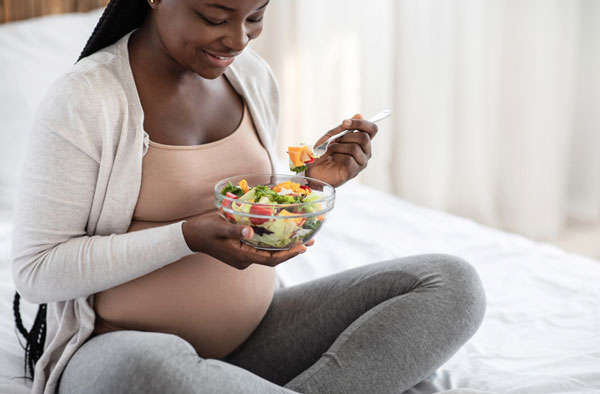Pregnancy is an exciting time for most women. Chances are, your diet will change due to the transformation your body is undergoing. You’ll want to be sure that you eat a nutritious diet since it’s linked to good brain development and a healthy birth weight. Nutritionists will also tell you that healthy eating can reduce the risk of many birth defects, and lessen unpleasant pregnancy symptoms such as fatigue and morning sickness.
Include a variety of foods, focusing on nutrient dense food choices such as these:
Grains: 6-8 oz/day
- 1oz= 1 slice of bread, ½c cooked starch, 2/3c RTE cereal
- Bread, pasta, oatmeal, cereal, and tortillas. Whole grains are those that have not been processed and include the whole grain kernel. They include oats, barley, quinoa, and brown rice. Look for the words “whole grain” on the product label.
Vegetables: 2½c-3c/day
- 1c= 1c raw, canned or cooked vegetables, 2c raw, leafy vegetables
- Make sure you get a mixture of dark green, orange, starchy, and other vegetables, including dry beans and peas.
Fruits: 1½-2c/day
- 1c= 1c raw fruits, ½c dried fruit, 1 small or ½ large piece of fruit, 1c juice
Protein: 5-6 ½ oz/day or 2 servings per day (1 serving=3oz, the size of a deck of cards)
- 1 oz= 1oz portion of lean cooked beef, pork, poultry, lamb or fish), 1 egg, ¼ c beans, 1/3 oz nuts, ¾ ¼ c tofu, 2 tbsp peanut butter
- Include a variety of protein in your diet and choose lean or low-fat meat and poultry.
Dairy: 3c/day
- 1c= 1c milk or yogurt, 1.5oz hard cheese, 2c cottage cheese, 1/3 c shredded cheese
- Make sure any dairy foods consumed are pasteurized.
Advice about caffeine consumption during pregnancy
- Although there have been many studies on whether caffeine increases the risk of miscarriage, or low birth weight infants, the results are unclear. Most studies concluded that consuming less than 200mg of caffeine a day (12oz coffee) are not associated with increased risk of miscarriages or preterm birth. However, although there is no clear evidence of harm, the effect cannot be determined definitively.
Advice about Fish Consumption during Pregnancy
- Eat 2-3 servings of fish (8-12oz in total) a week. This includes Atlantic mackerel, clam, cod, crab, crawfish, flounder, haddock, lobster, oyster, salmon, sardine, shrimp, squid, tilapia, freshwater trout, canned light tuna, whitefish, black sea bass. These fish have the lowest level of mercury. Or have 1 serving (no more than 4-6oz) of bluefish, chilean sea bass, grouper, halibut, mahi mahi, monkfish, snapper, striped bass (ocean), tuna, albacore, white tuna (canned/fresh/frozen), seatrout. Try to eat a variety of fish.
- Avoid refrigerated seafood products unless cooked before eating (165°F).
- Avoid raw or undercooked fish and seafood, including sushi and shellfish. All fish and shellfish should be cooked to 145°F.
- Observe local advisories regarding mercury and other contaminants.
Develop a Healthy Eating Plan
If you’re expecting and have noticed a change in your diet, or are experiencing cravings, it might be a good time to contact the dietitians at Behavioral Nutrition. We can help identify any behaviors that lead to unhealthy eating and put together a healthy eating plan to help you have a pleasant pregnancy.



